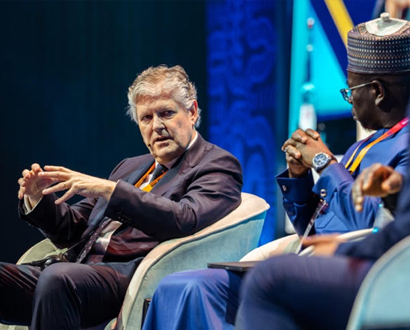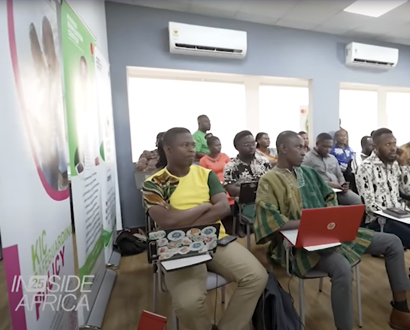Chairman and CEO Andy Inglis on our 2023 Sustainability Report

Kosmos Energy Announces First Quarter 2024 Results
May 7, 2024
Community Engagement in Saint Louis, Senegal
June 19, 2024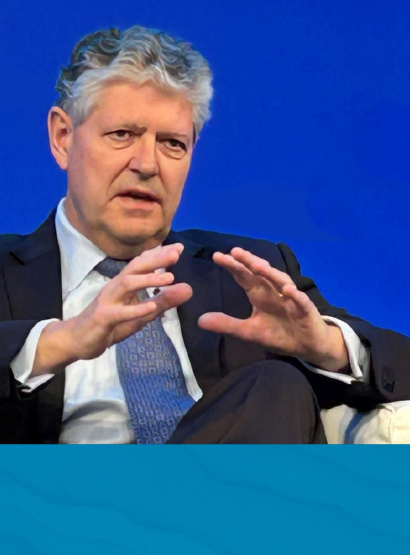
Fellow stakeholders,
As in the past, this year’s Sustainability Report brings you the latest data, information and narrative on how Kosmos embeds sustainability in everything we do. Our sustainability strategy is indivisible from our business strategy. I know these words may sound cliché since every company has its own formulation of Benjamin Franklin’s famous phrase about “doing well by doing good.”
But for me these aren’t mere words – they are a personal commitment. When I visit our host countries and speak to local people and business leaders, Presidents and elected officials, and our own employees and their families, I am reminded of the importance of Kosmos’ work, as well as its potential to make a difference to people’s lives. But to borrow another of Franklin’s sayings, “Well done is better than well said.” And I hope that you will see from this report that Kosmos is focused on being out there doing, not just talking – putting our words into action.
Africa’s energy crisis
Any success we have achieved in business and sustainability needs to be seen against the reality of the energy crisis in Africa today. Sometimes we can become inured to the human impact and deprivations that this crisis creates, so I would like to remind you of three key statistics:
• The latest figures from the International Energy Agency show that 745 million people in Africa lack access to energy.
• Nearly a billion people in Africa lack access to clean cooking fuels. According to the United Nations Environment Programme (UNEP) heating and cooking using biomass fuels results in a staggering 600,000 deaths every year.
• Africa – home to one fifth of the world’s population – still accounts for less than 3% of global CO2 emissions. This is pertinent when we consider that Africa is at greater risk than the rest of the world from an already extreme environment.
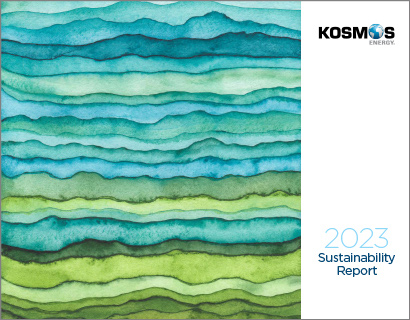
A just, orderly and equitable energy transition
The fundamental unfairness these statistics describe was highlighted in the recent COP28 agreement, which stated that the transition away from fossil fuels must be done in a “just, orderly and equitable manner.” We must ask ourselves if those Africans without power, whose lives are being shortened by unclean fuels and the impact of global warming are receiving just and equitable treatment. At Kosmos we believe there is much more to be done to achieve that outcome.
This is why our purpose as a company – and how it informs our business strategy – is so important. We are a leading deepwater exploration and production company focused on meeting the world’s growing demand for cleaner energy. With oil production from our low cost, lower carbon assets in Ghana, the Gulf of America, and Equatorial Guinea, we are providing Africa and the wider world with the energy it needs today. At the same time, we are developing cleaner sources of energy for the future, through world-scale gas projects offshore Mauritania and Senegal. And as we deliver the energy the world needs, we strive to be a force for good in our host countries, accelerating economic and social progress.
“With oil production from our low cost, lower carbon assets in Ghana, the Gulf of America, and Equatorial Guinea, we are providing Africa and the wider world with the energy it needs today.”
Kosmos is committed to producing energy for the African nations we partner with, to ameliorate the impact of the energy crisis they face. We are committed to doing so in the cleanest and most sustainable way possible, but we must never allow ourselves to become blind to the situation that Africa faces at this time. I am reminded of this when I see some in Europe and the U.S. advocate for cutting off natural gas investments – an action that could cripple Africa’s progress and further handicap the continent. This would move us ever further away from the just, orderly and equitable energy transition we should all want to happen.
Africa’s indigenous natural gas has, in the words of the COP28 agreement, an important role to play in “facilitating the energy transition while ensuring energy security.” Natural gas is a vital transition fuel that emits about 50 to 60 percent less CO2 than coal when combusted and about 20 to 30 percent less than heavy fuel oil. Enabling Africa to transition away from imported coal or heavy fuel oil to domestic gas in power generation would provide the reliable energy needed to improve living standards and spur economic development, while substantially reducing power sector emissions.
The truth is that Africa desperately needs more energy of all kinds to bring greater prosperity to its people. Modern commerce, most industries, and the entire digital economy all depend on reliable electricity. So while lack of household power hinders daily life, energy scarcity outside the home cripples economic opportunity. No economy can create lots of jobs without abundant and reliable power.
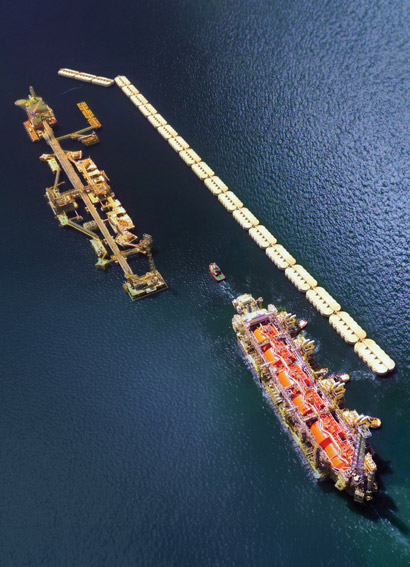
Growing production to meet demand
In 2023, Kosmos advanced our key development projects, which aim to deliver around 50% production growth from the second half of 2022. The start-up of Jubilee Southeast in Ghana was a major step toward achieving this goal and we expect production from Winterfell in the Gulf of America to be an important contributor as well. We expect these milestones to be followed by first gas at Greater Tortue Ahmeyim (GTA) offshore Mauritania and Senegal. By the end of 2024, we expect to grow production to around 90,000 barrels of oil equivalent per day. As part of this growth, we expect gas to increase from about 10% of overall production to around 25%. GTA will produce LNG for export and make gas available for domestic use. This gas has negligible carbon dioxide and minimal impurities, which reduces the need for processing ahead of transportation and liquefaction. In addition, Kosmos is working to develop Yakaar-Teranga offshore Senegal, one of the largest gas discoveries in recent years. We believe this gas field holds around 25 trillion cubic feet of advantaged gas-in-place, which has similarly beneficial characteristics to the gas at GTA. Kosmos assumed operatorship of Yakaar-Teranga in 2023. We are working with the national oil company on an innovative development concept that prioritizes cost-competitive gas to the rapidly growing domestic market, combined with an offshore LNG facility targeting exports into international markets.
Renewable energy now represents about 30% of Senegal’s power generation capacity with the aim to move to 40% by 2030. Natural gas can help achieve this goal by providing flexible baseload power, facilitating integration of variable renewable energy sources into the grid. A cleaner and more diversified energy mix will be required to meet the demands of a young and growing population while the country decarbonizes at the same time. Kosmos aims to be a part of the solution by providing domestic gas to displace imported heavy fuel oil.
Shifting our portfolio from oil to gas
As Kosmos looks to the future and our move towards natural gas, we are still investing in growing oil supply at each of our core production hubs in Ghana, the Gulf of America and Equatorial Guinea. We are doing this with an emphasis on high-graded projects that yield low cost, carbon-advantaged barrels. At the same time, we are working with our partners in Mauritania and Senegal to bring new sources of low cost, lower carbon natural gas into production. Kosmos intends to achieve and maintain top quartile carbon intensity in both our oil and gas portfolios.
Longer term, we plan to continue shifting the balance of our portfolio from oil to natural gas and LNG to help meet the world’s energy needs as cleaner natural gas displaces coal, heavy fuel oil, and biomass as a primary source of energy in both developed and emerging economies. As we increase the weighting of natural gas compared to oil in our portfolio, we expect the carbon intensity of our Scope 3 category 11 (use of sold products) emissions will decrease.
“As we increase the weighting of natural gas compared to oil in our portfolio, we expect the carbon intensity of our Scope 3 category 11 (use of sold products) emissions will decrease.”
Addressing climate change and emissions
With our advantaged oil and gas production, we can be a responsible producer that the world can count on to balance energy security and affordability with the need to lower emissions.
For the third consecutive year, we have maintained carbon neutrality for our operated Scope 1 and Scope 2 emissions, and in 2023 we announced a new near-term target to reduce by 25% our Scope 1 equity emissions in 2026 from a 2022 baseline. We are making good progress and are on track to meet this goal, which involves initiatives such as working with partners to eliminate routine flaring in Ghana and Equatorial Guinea.
Considering that our climate strategy is core to our business strategy, Kosmos is strengthening our climate-related disclosures this year by reporting our Scope 3 category 11 emissions using the internationally recognized GHG Protocol and industry-specific guidance from Ipieca. Since the Paris agreement in 2015, we have been following the complex and unresolved public debate about the measurement, disclosure, and management of Scope 3 emissions and, in particular, their relevance to our portfolio.
Despite having no direct control over these emissions, Kosmos has chosen to disclose this information. Our approach has been reviewed by a leading sustainability consultancy and our total Scope 3 category 11 emissions received review-level external assurance from EY. We plan to periodically review and refine our calculation methodology so we stay consistent with the evolving standards and best practices for Scope 3 emissions accounting and reporting.
Unwavering commitment to sustainability
Our commitment to sustainability has been recognized by stakeholders. MSCI, one of the leading ESG ratings agencies, awarded Kosmos its highest possible “AAA” rating for the second consecutive year, which puts us in the top 20% of companies across the sector. Similarly, Newsweek and Statista named Kosmos one of America’s Most Responsible Companies for the fourth consecutive year.
Executing our strategy relies on our ongoing commitment to operating responsibly. For us, this means that sustainability is never an add-on or an afterthought, but a commitment that begins with our board of directors and is embedded throughout the company from leadership to employees.
Safety
Safety has been, and always will be, a core value. In 2023, we had zero fatalities, a 0.21 lost time incident rate (LTIR), and a 0.42 total recordable incident rate (TRIR). While this level of performance is significantly better than the industry average, we believe we can improve. That’s why in 2023 we reviewed our HSE Training Program to look for ways to further enhance our strong safety record. Additionally, I have asked everyone at Kosmos to join me in re-committing to an HSE culture that strives to keep our people and contractors safe, no matter where they work.
Transparency
Kosmos has earned a reputation for transparency, particularly in our dealings with host governments. We believe the open nature of our business dealings fosters mutual accountability and builds trust with our stakeholders. We have long disclosed the terms of our petroleum agreements and reported payments made to host governments at both the project level and in aggregate. We are still the only U.S. oil and gas company to do so and we are proud to offer the sector a benchmark for transparency. Disclosures should provide clarity and benefit to shareholders and the countries where we operate. Not just data for the sake of data. As such, we take care to ensure the information we provide is both meaningful and valuable.

Investing in people and communities
By nurturing the next generation of entrepreneurs and facilitating innovation in sectors beyond oil and gas, Kosmos Innovation Center (KIC) programs contribute to the creation of healthier and more diverse economies in our host nations. Our focus on underprivileged or historically undervalued communities is an important part of our ethos.
In 2023, KIC Mauritania developed Ra’idat, a new two-month workshop for female entrepreneurs in which participants receive training on market research, price refinement, and business pitch development, among other topics. Ra’idat was inspired by the success of the women’s bootcamp at increasing the participation of women entrepreneurs in the established KIC Mauritania Innovation Challenge.
“Ra’idat was inspired by the success of the women’s bootcamp at increasing the participation of women entrepreneurs in the established KIC Mauritania Innovation Challenge.”
In 2024, KIC Senegal will be expanding its reach through a new program in Saint Louis emphasizing economic diversification and entrepreneurship training. It will focus on training women and young people to pursue income-generating activities in the fisheries, handicrafts and agricultural sectors. Local Kosmos staff and private sector experts will work alongside the entrepreneurs so they develop a full range of commercial and leadership skills they can use later in life – regardless of whether their start-ups ultimately succeed or fail.
Being a force for good
Our agenda is both exciting and ambitious, and requires continued input and debate with our investors, host governments, local communities, business partners, and others. We welcome these conversations and the opportunity to learn from them, especially as attitudes shift, driven by understanding the need for energy security, the moral imperative of a just energy transition, and the evolving definition of what it means to be a responsible company.
No matter what the future holds, I am confident that Kosmos will keep moving forward and acting responsibly. Our purpose informs everything we do, and sustainability is core to our business strategy and decision-making.
On behalf of everyone at Kosmos Energy, thank you for your continued support.

Chairman of the Board of Directors
and Chief Executive Officer


